Deck 19: CD - Pertcpm Models for Project Management
Question
Question
Question
Question
Question
Question
Question
Question
Question
Question
Question
Question
Question
Question
Question
Question
Question
Question
Question
Question
Question
Question
Question
Question
Question
Question
Question
Question
Question
Question
Question
Question
Question
Question
Question
Question
Question
Question
Question
Question
Question
Question
Question
Question
Question
Question
Question
Question
Question
Question
Question
Question
Question
Question
Question
Question
Question
Question
Question
Question
Question
Question
Question
Question
Question
Question
Question
Question
Question
Question
Question
Question
Question
Question
Question
Question
Question
Question
Question
Question

Unlock Deck
Sign up to unlock the cards in this deck!
Unlock Deck
Unlock Deck
1/93
Play
Full screen (f)
Deck 19: CD - Pertcpm Models for Project Management
1
The activities with the longest durations in a project network are called critical activities.
False
2
The latest starting time for an activity is equal to the latest finish time minus the duration of the activity.
True
3
A Gantt chart of a project shows the scheduled start and finish times for activities.
True
4
The earliest finish time for an activity is equal to the latest finish time minus the duration of the activity.

Unlock Deck
Unlock for access to all 93 flashcards in this deck.
Unlock Deck
k this deck
5
In an Activity-On-Node project network,the nodes are used to separate an activity from each of its immediate predecessors.

Unlock Deck
Unlock for access to all 93 flashcards in this deck.
Unlock Deck
k this deck
6
Projects involve routine activities that are performed repeatedly.

Unlock Deck
Unlock for access to all 93 flashcards in this deck.
Unlock Deck
k this deck
7
If two paths are tied for the longest duration,both would be considered to be critical paths.

Unlock Deck
Unlock for access to all 93 flashcards in this deck.
Unlock Deck
k this deck
8
The project network diagram describes sequential relationships among major activities in a project.

Unlock Deck
Unlock for access to all 93 flashcards in this deck.
Unlock Deck
k this deck
9
An activity in a project network cannot begin until all of the activities leading into that activity have been completed.

Unlock Deck
Unlock for access to all 93 flashcards in this deck.
Unlock Deck
k this deck
10
Project managers must often function in an environment that is beset with uncertainties.

Unlock Deck
Unlock for access to all 93 flashcards in this deck.
Unlock Deck
k this deck
11
In PERT,the path with the fewest activities is referred to as the critical path.

Unlock Deck
Unlock for access to all 93 flashcards in this deck.
Unlock Deck
k this deck
12
The earliest start of an activity is the latest early finish of any immediately preceding activity.

Unlock Deck
Unlock for access to all 93 flashcards in this deck.
Unlock Deck
k this deck
13
An immediate predecessor of an activity must be completed before that activity can begin.

Unlock Deck
Unlock for access to all 93 flashcards in this deck.
Unlock Deck
k this deck
14
The length of the critical path is determined by adding the expected completion times for all the activities in the project.

Unlock Deck
Unlock for access to all 93 flashcards in this deck.
Unlock Deck
k this deck
15
Although PERT and CPM were originally developed for somewhat different types of projects,they are now nearly identical in terms of analysis and procedures.

Unlock Deck
Unlock for access to all 93 flashcards in this deck.
Unlock Deck
k this deck
16
The values assigned to the nodes in a project network are there to identify the precedence relationships.

Unlock Deck
Unlock for access to all 93 flashcards in this deck.
Unlock Deck
k this deck
17
The earliest finish time for an activity is equal to the latest finish time minus the activity slack.

Unlock Deck
Unlock for access to all 93 flashcards in this deck.
Unlock Deck
k this deck
18
In PERT,the project duration will never exceed the expected duration of the critical path.

Unlock Deck
Unlock for access to all 93 flashcards in this deck.
Unlock Deck
k this deck
19
The sum of durations of the longest path in a project network indicates expected project completion time,and the activities are the critical activities.

Unlock Deck
Unlock for access to all 93 flashcards in this deck.
Unlock Deck
k this deck
20
The path in a project network with the average duration is the critical path.

Unlock Deck
Unlock for access to all 93 flashcards in this deck.
Unlock Deck
k this deck
21
A forward pass is the process of moving forward through the project network to determine the latest start times and latest finish times of each activity.

Unlock Deck
Unlock for access to all 93 flashcards in this deck.
Unlock Deck
k this deck
22
The slack of any activity is the amount of time that the activity can be delayed without delaying the completion of the project.

Unlock Deck
Unlock for access to all 93 flashcards in this deck.
Unlock Deck
k this deck
23
The slack of an activity is the difference between the latest finish and the earliest finish times.

Unlock Deck
Unlock for access to all 93 flashcards in this deck.
Unlock Deck
k this deck
24
The PERT three-estimate approach can be used to determine the probability that a project will be completed by a certain time.

Unlock Deck
Unlock for access to all 93 flashcards in this deck.
Unlock Deck
k this deck
25
When making a backward pass through a project network,you must start at the finish node.

Unlock Deck
Unlock for access to all 93 flashcards in this deck.
Unlock Deck
k this deck
26
If an activity is not on the critical path,then the project cannot be delayed if that activity is delayed.

Unlock Deck
Unlock for access to all 93 flashcards in this deck.
Unlock Deck
k this deck
27
Crashing an activity will always reduce the duration of a project.

Unlock Deck
Unlock for access to all 93 flashcards in this deck.
Unlock Deck
k this deck
28
Crashing cannot be accomplished by using different materials than originally planned.

Unlock Deck
Unlock for access to all 93 flashcards in this deck.
Unlock Deck
k this deck
29
PERT/Cost is a systematic procedure to help a project manager bid on a project.

Unlock Deck
Unlock for access to all 93 flashcards in this deck.
Unlock Deck
k this deck
30
In order to determine the probability of timely project completion,it is sometimes necessary to take into account paths other than the critical path.

Unlock Deck
Unlock for access to all 93 flashcards in this deck.
Unlock Deck
k this deck
31
When calculating the probability that a project will finish by a certain time,the approximation that is obtained is usually lower than the true probability.

Unlock Deck
Unlock for access to all 93 flashcards in this deck.
Unlock Deck
k this deck
32
The standard deviation of the critical path is equal to the sum of the standard deviations of all the activities on the critical path.

Unlock Deck
Unlock for access to all 93 flashcards in this deck.
Unlock Deck
k this deck
33
The CPM method provides an excellent procedure for evaluating time-cost tradeoffs.

Unlock Deck
Unlock for access to all 93 flashcards in this deck.
Unlock Deck
k this deck
34
The mean critical path is the path through the project network that would be the critical path if the duration of each activity equals its mean.

Unlock Deck
Unlock for access to all 93 flashcards in this deck.
Unlock Deck
k this deck
35
A manager has decided that an activity has a pessimistic estimate of 15 days,a most-likely estimate of 6 days,and an optimistic estimate of 3 days.The expected duration of this activity is 6 days.

Unlock Deck
Unlock for access to all 93 flashcards in this deck.
Unlock Deck
k this deck
36
If the variance of an activity duration is equal to 1 then all the durations are the same.

Unlock Deck
Unlock for access to all 93 flashcards in this deck.
Unlock Deck
k this deck
37
Activities that are not on the critical path have a slack time equal to zero.

Unlock Deck
Unlock for access to all 93 flashcards in this deck.
Unlock Deck
k this deck
38
The latest finish of an activity is the earliest late start of any immediately preceding activity.

Unlock Deck
Unlock for access to all 93 flashcards in this deck.
Unlock Deck
k this deck
39
Only activities on the critical path are initial candidates for crashing.

Unlock Deck
Unlock for access to all 93 flashcards in this deck.
Unlock Deck
k this deck
40
A normal distribution is usually used to describe the form of the probability distribution of activity durations in the PERT three-estimate approach.

Unlock Deck
Unlock for access to all 93 flashcards in this deck.
Unlock Deck
k this deck
41
There is currently no method that permits activities and their immediate predecessors to overlap.
Multiple Choice Questions
Multiple Choice Questions

Unlock Deck
Unlock for access to all 93 flashcards in this deck.
Unlock Deck
k this deck
42
Figure 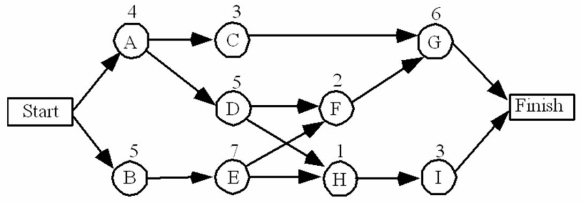 Given this network:
Given this network:
The expected duration of this project is:
A)12.
B)17.
C)20.
D)36.
E)77.
 Given this network:
Given this network:The expected duration of this project is:
A)12.
B)17.
C)20.
D)36.
E)77.

Unlock Deck
Unlock for access to all 93 flashcards in this deck.
Unlock Deck
k this deck
43
Figure 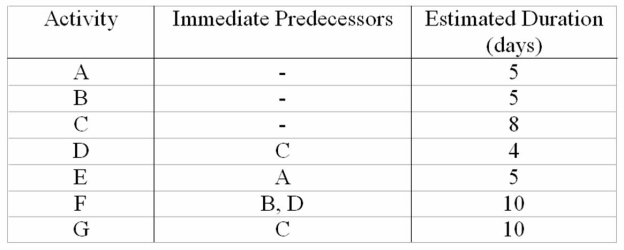
The critical path is:
A)A-E.
B)B-F.
C)C-D-F.
D)C-G.
E)there are two critical paths.

The critical path is:
A)A-E.
B)B-F.
C)C-D-F.
D)C-G.
E)there are two critical paths.

Unlock Deck
Unlock for access to all 93 flashcards in this deck.
Unlock Deck
k this deck
44
PERT/CPM can answer which of the following questions?
A)When do activities need to start and finish to meet a deadline?
B)How much delay can be tolerated for certain activities?
C)Given uncertainties,what is the probability that a project will finish on time?
D)What is the least expensive way to expedite a project to meet a deadline?
E)All of the above.
A)When do activities need to start and finish to meet a deadline?
B)How much delay can be tolerated for certain activities?
C)Given uncertainties,what is the probability that a project will finish on time?
D)What is the least expensive way to expedite a project to meet a deadline?
E)All of the above.

Unlock Deck
Unlock for access to all 93 flashcards in this deck.
Unlock Deck
k this deck
45
Activity C has an early start time of 8,an early finish time of 12,a latest start time of 13,and a latest finish time of 17.Its slack is:
A)0.
B)1.
C)4.
D)5.
E)9.
A)0.
B)1.
C)4.
D)5.
E)9.

Unlock Deck
Unlock for access to all 93 flashcards in this deck.
Unlock Deck
k this deck
46
In a project network the critical path is the sequence of activities which has:
A)the most activities.
B)the fewest activities.
C)the most events.
D)the longest time.
E)the greatest variance.
A)the most activities.
B)the fewest activities.
C)the most events.
D)the longest time.
E)the greatest variance.

Unlock Deck
Unlock for access to all 93 flashcards in this deck.
Unlock Deck
k this deck
47
Given this information about activity H: ES = 10,EF = 15,LS = 16,and LF = 21,we can determine that the amount of slack associated with the activity is:
A)0.
B)1.
C)5.
D)6.
E)11.
A)0.
B)1.
C)5.
D)6.
E)11.

Unlock Deck
Unlock for access to all 93 flashcards in this deck.
Unlock Deck
k this deck
48
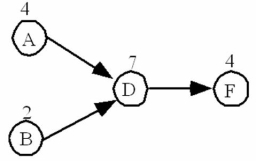 Given the portion of the network shown above,what is the earliest finish time for activity D,if the earliest start time of A is 12 and the earliest start time of B is 13?
Given the portion of the network shown above,what is the earliest finish time for activity D,if the earliest start time of A is 12 and the earliest start time of B is 13?A)22.
B)23.
C)24.
D)25.
E)26.

Unlock Deck
Unlock for access to all 93 flashcards in this deck.
Unlock Deck
k this deck
49
Concerning PERT and CPM:
A)These are two different names for essentially the same technique.
B)CPM tends to focus more on the critical path.
C)PERT gives a better indication of activity slack,CPM a better picture of path slack.
D)Because of its recent discovery,much less is known about CPM that PERT.
E)All of the above are true.
A)These are two different names for essentially the same technique.
B)CPM tends to focus more on the critical path.
C)PERT gives a better indication of activity slack,CPM a better picture of path slack.
D)Because of its recent discovery,much less is known about CPM that PERT.
E)All of the above are true.

Unlock Deck
Unlock for access to all 93 flashcards in this deck.
Unlock Deck
k this deck
50
A project manager does not need to monitor each individual activity,just the overall project when looking at budget costs.

Unlock Deck
Unlock for access to all 93 flashcards in this deck.
Unlock Deck
k this deck
51
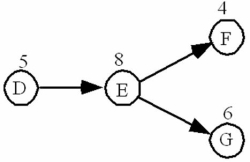 Given the portion of the network shown above,what is the latest start time of activity D if the latest finish of activity F is 26 and the latest finish of activity G is 23?
Given the portion of the network shown above,what is the latest start time of activity D if the latest finish of activity F is 26 and the latest finish of activity G is 23?A)3.
B)4.
C)9.
D)10.
E)12.

Unlock Deck
Unlock for access to all 93 flashcards in this deck.
Unlock Deck
k this deck
52
The earliest start time for an activity is:
A)based on the length of the critical path.
B)determined by the maximum of the earliest finish times of its immediate predecessors.
C)determined by the maximum of the earliest finish times of its immediate successors.
D)the same as the latest start time of its immediate predecessor.
E)None of the above.
A)based on the length of the critical path.
B)determined by the maximum of the earliest finish times of its immediate predecessors.
C)determined by the maximum of the earliest finish times of its immediate successors.
D)the same as the latest start time of its immediate predecessor.
E)None of the above.

Unlock Deck
Unlock for access to all 93 flashcards in this deck.
Unlock Deck
k this deck
53
Figure 
The duration of the critical path is:
A)11 days.
B)20 days.
C)18 days.
D)22 days.
E)15 days.

The duration of the critical path is:
A)11 days.
B)20 days.
C)18 days.
D)22 days.
E)15 days.

Unlock Deck
Unlock for access to all 93 flashcards in this deck.
Unlock Deck
k this deck
54
Once a project is underway,the project manager is responsible for effectively managing:
A)the people.
B)costs.
C)time.
D)a and b.
E)a,b,and c.
A)the people.
B)costs.
C)time.
D)a and b.
E)a,b,and c.

Unlock Deck
Unlock for access to all 93 flashcards in this deck.
Unlock Deck
k this deck
55
AON project networks have which of the following advantages over AOA networks?
A)They are easier to construct.
B)They allow the project to be completed faster.
C)They are easier to revise when there are changes in a project.
D)a and c only.
E)b and c only.
A)They are easier to construct.
B)They allow the project to be completed faster.
C)They are easier to revise when there are changes in a project.
D)a and c only.
E)b and c only.

Unlock Deck
Unlock for access to all 93 flashcards in this deck.
Unlock Deck
k this deck
56
Figure 
The path with the greatest slack is:
A)A-E.
B)B-F.
C)C-D-F.
D)C-G.
E)None of the above.

The path with the greatest slack is:
A)A-E.
B)B-F.
C)C-D-F.
D)C-G.
E)None of the above.

Unlock Deck
Unlock for access to all 93 flashcards in this deck.
Unlock Deck
k this deck
57
PERT/Cost can be used to monitor budget overruns.

Unlock Deck
Unlock for access to all 93 flashcards in this deck.
Unlock Deck
k this deck
58
In project network analysis,slack refers to the difference between:
A)observed and predicted times.
B)optimistic and pessimistic times.
C)latest finish and latest start times.
D)earliest finish and earliest start times.
E)latest start and earliest start times.
A)observed and predicted times.
B)optimistic and pessimistic times.
C)latest finish and latest start times.
D)earliest finish and earliest start times.
E)latest start and earliest start times.

Unlock Deck
Unlock for access to all 93 flashcards in this deck.
Unlock Deck
k this deck
59
Which of the following is not a feature of PERT/CPM?
A)An estimate of how long a project will take.
B)A graphical display of project activities.
C)An indication of crucial activities.
D)An indication of slack time.
E)All are features.
A)An estimate of how long a project will take.
B)A graphical display of project activities.
C)An indication of crucial activities.
D)An indication of slack time.
E)All are features.

Unlock Deck
Unlock for access to all 93 flashcards in this deck.
Unlock Deck
k this deck
60
A common assumption when using PERT/Cost is that the costs are incurred at a constant rate throughout the duration of an activity.

Unlock Deck
Unlock for access to all 93 flashcards in this deck.
Unlock Deck
k this deck
61
When finding the approximate probability of project duration,it is necessary to know which of the following?
A)The mean and variance of each activity.
B)The mean of each activity on the critical path.
C)The standard deviation of only the activities on the critical path.
D)Each activity's probability of completion.
E)The distribution of activity times.
A)The mean and variance of each activity.
B)The mean of each activity on the critical path.
C)The standard deviation of only the activities on the critical path.
D)Each activity's probability of completion.
E)The distribution of activity times.

Unlock Deck
Unlock for access to all 93 flashcards in this deck.
Unlock Deck
k this deck
62
Figure  (time in days)
(time in days)
What is the estimated mean time for project completion?
A)160 days.
B)170 days.
C)200 days.
D)210 days.
E)300 days.
 (time in days)
(time in days)What is the estimated mean time for project completion?
A)160 days.
B)170 days.
C)200 days.
D)210 days.
E)300 days.

Unlock Deck
Unlock for access to all 93 flashcards in this deck.
Unlock Deck
k this deck
63
There are four activities on the critical path,and they have standard deviations of 1,2,4,and 2 days.The standard deviation of the critical path is:
A)3 days.
B)5 days.
C)9 days.
D)16 days.
E)25 days.
A)3 days.
B)5 days.
C)9 days.
D)16 days.
E)25 days.

Unlock Deck
Unlock for access to all 93 flashcards in this deck.
Unlock Deck
k this deck
64
Figure  (time in days)
(time in days)
What is the estimated mean time for project completion?
A)100 days.
B)140 days.
C)199 days.
D)200 days.
E)440 days.
 (time in days)
(time in days)What is the estimated mean time for project completion?
A)100 days.
B)140 days.
C)199 days.
D)200 days.
E)440 days.

Unlock Deck
Unlock for access to all 93 flashcards in this deck.
Unlock Deck
k this deck
65
The standard deviation of a path is computed as:
A)the sum of the standard deviations of all activities on the path.
B)the square root of the sum of the standard deviations of all activities on the path.
C)the sum of the variances of all activities on the path.
D)the square root of the sum of the variances of all activities on the path.
E)None of the above.
A)the sum of the standard deviations of all activities on the path.
B)the square root of the sum of the standard deviations of all activities on the path.
C)the sum of the variances of all activities on the path.
D)the square root of the sum of the variances of all activities on the path.
E)None of the above.

Unlock Deck
Unlock for access to all 93 flashcards in this deck.
Unlock Deck
k this deck
66
Figure 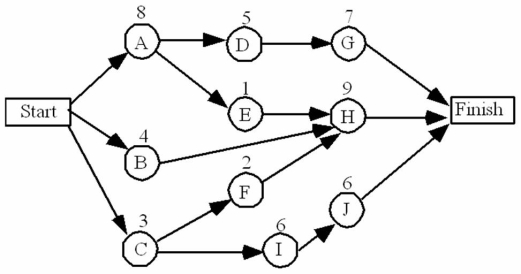 Given this network:
Given this network:
The path with the greatest slack is:
A)A-E-H.
B)B-H.
C)A-D-G.
D)C-F-H.
E)C-I-J.
 Given this network:
Given this network:The path with the greatest slack is:
A)A-E-H.
B)B-H.
C)A-D-G.
D)C-F-H.
E)C-I-J.

Unlock Deck
Unlock for access to all 93 flashcards in this deck.
Unlock Deck
k this deck
67
Figure  (time in days)
(time in days)
What is the estimated mean time for activity E?
A)91 days.
B)99 days.
C)100 days.
D)101 days.
E)115 days.
 (time in days)
(time in days)What is the estimated mean time for activity E?
A)91 days.
B)99 days.
C)100 days.
D)101 days.
E)115 days.

Unlock Deck
Unlock for access to all 93 flashcards in this deck.
Unlock Deck
k this deck
68
Activity C in a project network has an optimistic time estimate of five days,a most likely time estimate of seven days,and a pessimistic time estimate of nine days.Its expected duration is approximately:
A)5 days.
B)6 days.
C)7 days.
D)8 days.
E)9 days.
A)5 days.
B)6 days.
C)7 days.
D)8 days.
E)9 days.

Unlock Deck
Unlock for access to all 93 flashcards in this deck.
Unlock Deck
k this deck
69
There are four activities on the critical path.Coincidentally,their standard deviations are all equal to 4.The standard deviation of the critical path is therefore equal to:
A)2 days.
B)4 days.
C)8 days.
D)16 days.
E)64 days.
A)2 days.
B)4 days.
C)8 days.
D)16 days.
E)64 days.

Unlock Deck
Unlock for access to all 93 flashcards in this deck.
Unlock Deck
k this deck
70
Figure  (time in days)
(time in days)
What is the probability that this project will be completed within 205 days?
A)0.6826.
B)0.8413.
C)0.9544.
D)0.9772.
E)0.9987.
 (time in days)
(time in days)What is the probability that this project will be completed within 205 days?
A)0.6826.
B)0.8413.
C)0.9544.
D)0.9772.
E)0.9987.

Unlock Deck
Unlock for access to all 93 flashcards in this deck.
Unlock Deck
k this deck
71
Figure  (time in days)
(time in days)
What is the estimated slack time for activity A?
A)0 days.
B)20 days.
C)40 days.
D)60 days.
E)100 days.
 (time in days)
(time in days)What is the estimated slack time for activity A?
A)0 days.
B)20 days.
C)40 days.
D)60 days.
E)100 days.

Unlock Deck
Unlock for access to all 93 flashcards in this deck.
Unlock Deck
k this deck
72
Figure  Given this network:
Given this network:
The slack for path A-D-H-I is:
A)0.
B)3.
C)4.
D)7.
E)8.
 Given this network:
Given this network:The slack for path A-D-H-I is:
A)0.
B)3.
C)4.
D)7.
E)8.

Unlock Deck
Unlock for access to all 93 flashcards in this deck.
Unlock Deck
k this deck
73
Figure  (time in days)
(time in days)
What is the estimated standard deviation in the time for activity E?
A)1 days.
B)2 days.
C)3 days.
D)4 days.
E)5 days.
 (time in days)
(time in days)What is the estimated standard deviation in the time for activity E?
A)1 days.
B)2 days.
C)3 days.
D)4 days.
E)5 days.

Unlock Deck
Unlock for access to all 93 flashcards in this deck.
Unlock Deck
k this deck
74
Figure  (time in days)
(time in days)
What is the estimated standard deviation in the time for activity E?
A)2 days.
B)3 days.
C)4 days.
D)16 days.
E)24 days.
 (time in days)
(time in days)What is the estimated standard deviation in the time for activity E?
A)2 days.
B)3 days.
C)4 days.
D)16 days.
E)24 days.

Unlock Deck
Unlock for access to all 93 flashcards in this deck.
Unlock Deck
k this deck
75
An activity has an optimistic time estimate of three days,a most likely time estimate of eight days,and a pessimistic time estimate of ten days.The expected duration of this activity is:
A)7.0 days.
B)7.5 days.
C)8.0 days.
D)8.5 days.
E)10.0 days.
A)7.0 days.
B)7.5 days.
C)8.0 days.
D)8.5 days.
E)10.0 days.

Unlock Deck
Unlock for access to all 93 flashcards in this deck.
Unlock Deck
k this deck
76
Figure  Given this network:
Given this network:
The critical path for the network shown is:
A)A-C-G.
B)A-D-F-G.
C)A-D-H-I.
D)B-E-F-G.
E)B-E-H-I.
 Given this network:
Given this network:The critical path for the network shown is:
A)A-C-G.
B)A-D-F-G.
C)A-D-H-I.
D)B-E-F-G.
E)B-E-H-I.

Unlock Deck
Unlock for access to all 93 flashcards in this deck.
Unlock Deck
k this deck
77
Figure  Given this network:
Given this network:
The critical path for the network shown is:
A)A-E-H.
B)B-H.
C)A-D-G.
D)C-F-H.
E)C-I-J.
 Given this network:
Given this network:The critical path for the network shown is:
A)A-E-H.
B)B-H.
C)A-D-G.
D)C-F-H.
E)C-I-J.

Unlock Deck
Unlock for access to all 93 flashcards in this deck.
Unlock Deck
k this deck
78
An important assumption in PERT calculations is:
A)activity durations are normally distributed.
B)activity durations are independent.
C)a computer will be available to do the calculations.
D)a and b only.
E)a and c only.
A)activity durations are normally distributed.
B)activity durations are independent.
C)a computer will be available to do the calculations.
D)a and b only.
E)a and c only.

Unlock Deck
Unlock for access to all 93 flashcards in this deck.
Unlock Deck
k this deck
79
Figure  Given this network:
Given this network:
The expected duration of this project is:
A)13.
B)15.
C)20.
D)52.
E)81.
 Given this network:
Given this network:The expected duration of this project is:
A)13.
B)15.
C)20.
D)52.
E)81.

Unlock Deck
Unlock for access to all 93 flashcards in this deck.
Unlock Deck
k this deck
80
Figure  (time in days)
(time in days)
What is the estimated mean time for activity E?
A)35 days.
B)36 days.
C)39 days.
D)40 days.
E)45 days.
 (time in days)
(time in days)What is the estimated mean time for activity E?
A)35 days.
B)36 days.
C)39 days.
D)40 days.
E)45 days.

Unlock Deck
Unlock for access to all 93 flashcards in this deck.
Unlock Deck
k this deck


